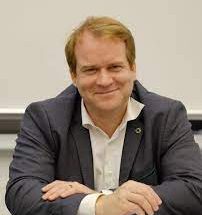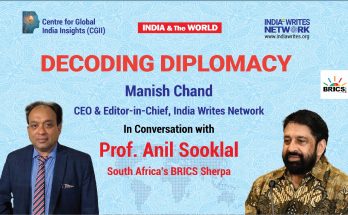“I have read more books than I have eaten food. The matter for my writing comes from there. Writing is activism for me.” Mahasweta Devi.
Meeting Mahasweta Devi was an experience which is indescribable. I was extremely apprehensive as she is said to have little patience with armchair academics. However, she was quick to put my mind at rest and what was meant to be a one hour interview, stretched to 2 days where she spoke at length on her current phase of activism – Singur and Nandigram.
What strikes one about Mahasweta Devi is her simplicity and her forthrightness. She is frank to the point of being brutal and yet she is childlike in her simplicity. Her compassion envelopes all poor and needy – she is “Ma” to most tribals and de-notified tribes, among whom she has worked extensively. In spite of her failing health, she sat for hours on a chair without a back rest. In the sweltering heat of Kolkata, sometimes, the fan would go off, but she took it all in her stride saying “Amar Asubidhe hoy na” (I’m not inconvenienced at all). The phone kept ringing as she gave instructions to doctors and donors to contribute towards the hospital in Nandigram.
Mahaswta’s sense of humour is infectious as she called herself “a hardened criminal” in the eyes of the Government of West Bengal. She has the ability to laugh at herself and the world which gives her writing a razor sharp edge. I was particularly struck by her memory as she mentions dates and events with perfect ease. She explains the phenomenon by talking about her love for history – not of the text book kinds but those written in invisible ink between the lines. She is a keen interpreter of mass histories which the mainstream tries to marginalize. She does not see herself speaking on behalf of the marginalized. According to her, the poor, the downtrodden and the subaltern have always been speaking. It is just that their voices are muted and subsumed in the mainstream discourse. She merely decodes and brings these voices to the fore. Not only can the subaltern speak, they have been speaking through the ages. It needs a keen ear to hear them and a pen like Mahasweta’s to give them their due in the construction of the people’s history. Recepient of the Padmashree, Padmabibhushan, Gyanpeeth and the Magsaysay, she is a living legend. The fact that writing and activism can go hand in hand and with the same level of honesty, Mahasweta has proved with her life which continues to be exemplary in her quest of justice for all downtrodden and marginalized.
Mahasweta Devi (MD) in conversation with Nandini Sen (NS)
NS- Could you tell us about the genesis of the coming together of your activism and your writing?
MD– In the beginning, I started my literary career with the biography of Rani of Jhansi. I remained interested in history. For me the real history remains in the space between two printed lines – the white space because there one has to search for people’s history. Even for writing my first book which came out in 1956, I, at the age of 28 had gone to Jhansi, Gwalior and other places, all alone, and collected from the people, folklores, songs, etc. I still remember villagers sitting around a wood fire; it was December – very cold. They sang the following lines,
“Patthar mitti se fauj banaye,
kat se katwar,
Pahaar utha kar ghora banayii,
Chali Gwalior…..”
It is also true that all my life I have been or remained a professional writer. Writing is the only way to support myself and my extended family. After the 1970s I have been involved in people’s history. It came naturally to me. I should make it clear that I have written a lot of potboilers because pressures on a professional writer remain heavy. And I have not written for the Anandabazar group of papers alone. In fact Jhansir Rani was first serialized in Desh Weekly. And three four commissioned articles followed. Then I wrote for many papers. Also, from the late 60s till date I have written newspaper columns in Bengali, I still do. There was a time I wrote for the Economic and Political Weekly, the Frontier, the Business Standard, etc. Writing in English was associated with a very important phase of activism. I wrote on bonded laborers of Palamau. Also I was instrumental in writing about the de-notified tribes of West Bengal and fight for their human rights. The British in 1871, branded 200 to 250 tribes all over the undivided India. In West Bengal, there are 3 such notified tribes – the Lodhas of the Medinipur, the Khedia Shobors of Purulia and Dhikaros of Birbhum.
NS- How did it become an All India Movement?
MD-In 1998 Budhan Shabor of Purulia was brutally killed by the police. The British declared them as criminal tribes. After independence in 1952 the government of India declared them as de-notified i.e. they were no longer notified as criminal tribes but Denotified Tribes. After Budhan’s death something snapped in me. I went to the Kolkata court and filed a PIL against the State Government. Fortunately we won the case. Budhan’s wife received a compensation of 1 Lakh. Unfortunately in 1999 Bhadra Shobor was stoned to death. Why? To be a de-notified tribe the police kills them, the neighbours kill them and anybody can kill them. In between 1997 to 1999, 37 Lodhas were brutally killed in Medinipur. The government did nothing. And in 1992, Chuni Kotal, a Lodha girl, the first woman graduate among Lodhas had joined Medinipur Tribal Girls Hostel as Superintendent. She took admission in the MedinipurVidyasagarUniversity to study Anthropology as she wanted to fight the stigma against the Governments de-notification. The then University authorities and the S.F. heckled her as she was a Lodha and had little right to finish her education and serve her tribe. She had married an excellent Lodha boy and was happy but she had to commit suicide as she could not fight the mainstream. In 1998, when Budhan’s case was in the court, Dr. G N Devi invited me to Baroda for his BhashaCenter’s Elwin Lectures. There I said, “It is not enough to work for the tribals alone. What about the denotified tribes?” On that day between me, Dr. Devi and Lakshman Gaekwad, “Denotified or Nomadic Tribe – Rights Action Group” was formed. And we reported each atrocity case from Mahrashtra, Gujrat, Rajasthan. Madhya Pradesh, Bihar, Jharkhand and West Bengal. First to NHRC – National Human Rights Commission – to extensively go all over the states, to go to the spot – investigate and report. The chairperson of NHRC – Justice Verma took excellent steps and many grievances were settled. He had called Chief Secretaries of all the states as we were demanding fundamental human rights for the Denotified Tribes. I am happy to say that in 2006 i.e. on 14/1/2006, Ganesh Devi and I handed our demands to the Prime Minister. The government set up a commission under Balakrishna Renke to look into the demands and help the government of India for funds – for land, rehabilitation, school and other Fundamental Human Rights. I am sorry to say that Renke, till date, has not been able to demand a suitable fund for this. The work regarding Denotified tribes remains documented by Dr. Devi.
Working for the Denotified Tribes is one side of the work that I have done from the 70s to 2006 sustainingly. Dr. Devi and I have built India’s first TribalAcademy in Tejgarh near Baroda. Also in my writing, in the major books I have written extensively about people. “Basai Tudu” and “Pterodactyl” and others have been translated in English but not all. Neither “Aranyer Adhikar” nor “Andharmani” (Kobi Mrityu) these are not yet translated.
NS- Are you happy with the translations of your works into English ?
MD- Because Gayatri translated stories like “Draupadi”, “Breast Giver”, “Pterodactyl” was read by other language people. Since I do not translate myself, I have no acumen to judge her or other translators. Then I am very proud to say that in Bengali, my complete works are coming out in several volumes. 19 have been published. According to the Editor Ajoy Gupta it won’t be complete in my lifetime or in his lifetime.
And writing is activism for me. From 1982 till date I have been very closely associated with the Purulia Khedia Shobor Kalyan Samity. I used to walk 15-18 miles a day but now I cannot. I do what I can through my writing. From November 2006 I am writing extensively on Singur and Nandigram. I am happy to say that doctors and others are going there regularly starting health centers in Sonachura and Gokulnagar. For this we are not asking for any funds, all we are asking for through my columns is that we need generators, used bicycles, used ceiling fans etc be donated to the hospital there. Doctors are giving extensive health worker training to high school students — boys and girls. They are giving midwifery training to low literacy village women.
Nandigram is very enthused. They are co-operating; they are writing a new chapter of history for the world. I help with my newspaper columns. I also want to write on their struggle. Whether I will find time for it or not I do not know. Yet it is a concrete dream for me and I am proving each day that writing remains the ultimate activism for me.
NS- Please talk about your Literary Influences.
MD- I have lived to see the British rule, after that Independence. I am still alive and want to live for another 18 years and want to write. (She turns 100 in 18 years time).
Mukunda Ram Chakraborti, the 16th Century poet, – “Kobi Kankan Chandi” remains a permanent literary guide for me. Robindranath Tagore remains a source of inspiration as from 1936 to 1938 I was in Shantiniketan. From Shantiniketan I learned to be self disciplined. Adherence to time in one’s life, to study nature at first hand, to love insect, bird and animal life. These teachings still remain with me. Of course, writers like Bibhuti Bhusan Bandopadhyay, Tara Shankar Bandopadhyay, Satinath Bhaduri, Manik Bandopadhyay, Jyotirmoyee Devi, Leel Mazumdar are my favourite authors.
NS-You play around with Epics- “Draupadi”, “After Kurukshetra”? Do you think the caste class angle is rather potent in the epics?
MD- Again it is the same, it is the white spaces between the lines in Ramayana and Mahabharata. There is Kunti, the queen mother and the Nishadin, who with her sons were burnt alive in the lac palace. In my life, I have read more than I have eaten food. I was a voracious reader. The potent gaps in history fascinate me and I write about them. Jashoda of “Standayini” is a traditional name. It is not a subversion.
NS- In Bedonabala you talk of sex workers…
MD- Sex workers are living human beings just as anyone of us. Sex workers helped a lot during anti British movements. They gave money during the freedom struggle. All my life I have lived with open eyes. And therefore I write of events and happenings which are not written or talked about in the mainstream.
NS- What is the worst case of Police atrocity you have seen?
MD- Budhan’s case. His wife complained. They tried to say he committed suicide. The tribals bury their dead instead of cremating them. Budhan’s father kept the case alive, he is a freedom fighter from 1942.
NS- Would you call yourself a feminist?
MD- I write for all people who have been marginalized. Men women and Children are all equally abused when they belong to the weaker section of the society. My stories are not about women alone. I write for all oppressed people.
NS – Would you call yourself a feminist?
In would not call myself a feminist. I write about all oppressed people. My mother was a very bold woman. She used to help all women refugees who used to come from East Bengal when we used to stay in Behrampur. She did not believe in the caste system and would treat everyone equally. The poor and the oppressed do not need empowerment. They are extremely powerful. Otherwise where do women like Taposi Malik come from? I draw my strength from them. I draw my strength from the indigenous people’s movements around us. Singur and Nandigram have given me a new lease of life. Medha Patkar and I did not visit Singur at the behest of any political party. The people of Singur took us there. I thank them for reinstating my faith in the masses. Whether Birsa Munda or whether it is the masses of Singur and Nandigram, I promise to walk by you always.
(This interview was published in Mahasweta Devi: Critical Perspectives (in 2011) by Pencraft International. Dr. Nandini Choudhury Sen is Associate Professor of English at Cluster Innovation Centre, University of Delhi.)
Author Profile
- India Writes Network (www.indiawrites.org) is an emerging think tank and a media-publishing company focused on international affairs & the India Story. Centre for Global India Insights is the research arm of India Writes Network. To subscribe to India and the World, write to editor@indiawrites.org. A venture of TGII Media Private Limited, a leading media, publishing and consultancy company, IWN has carved a niche for balanced and exhaustive reporting and analysis of international affairs. Eminent personalities, politicians, diplomats, authors, strategy gurus and news-makers have contributed to India Writes Network, as also “India and the World,” a magazine focused on global affairs.
Latest entries
 DiplomacyApril 23, 2024Resetting West Asia, re-booting the world, but not fast enough: T.S. Tirumurti
DiplomacyApril 23, 2024Resetting West Asia, re-booting the world, but not fast enough: T.S. Tirumurti India and the WorldApril 22, 2024India’s G20 Legacy: Mainstreaming Africa, Global South in global agenda
India and the WorldApril 22, 2024India’s G20 Legacy: Mainstreaming Africa, Global South in global agenda DiplomacyApril 10, 2024Diplomat-author Lakshmi Puri pitches for women power at LSR
DiplomacyApril 10, 2024Diplomat-author Lakshmi Puri pitches for women power at LSR India and the WorldApril 6, 2024UN envoy pitches to take India’s solutions to the world stage
India and the WorldApril 6, 2024UN envoy pitches to take India’s solutions to the world stage







